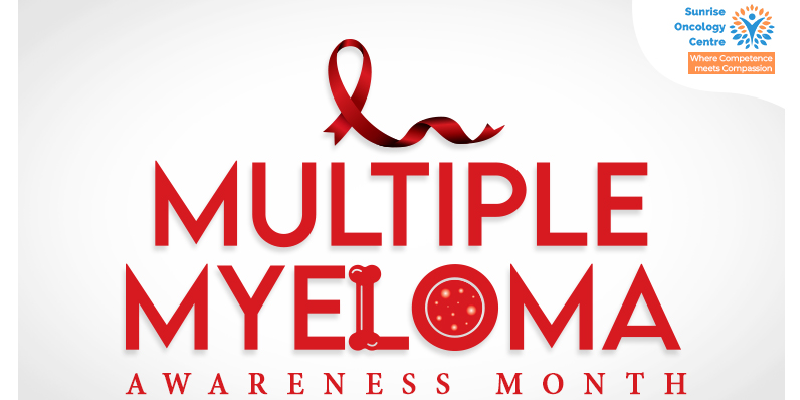Myeloma is commonly called “Multiple Myeloma” and it occurs in the blood by attacking the healthy plasma cells of the body. It is a type of blood cancer that grows abnormally by the multiplication of antibodies. It affects your body’s ability to make red and white blood cells and platelets. These directly lower your immune system by affecting tissues and organs such as bones and kidneys. It also makes your body vulnerable to infections and diseases.
Types of Myeloma
Myeloma is a plasma cell disorder that has several types of blood cancer affecting different parts of the body or organs. The most prominent types of Myeloma are –
- Multiple Myeloma – It develops in the bone marrow and then starts spreading to other parts of the body. In this situation instead of producing healthy antibodies, the body starts producing abnormally high levels of protein resulting in complications.
- Solitary plasmacytoma – It is an early-stage plasma malignancy that happens in either bone or tissue.
- Extramedullary plasmacytoma – It is a neoplastic plasma cell that occurs outside the bone, especially in the head and neck region, and the aerodigestive tract (UAD) area.
Symptoms of Myeloma
Myeloma is a rare condition and occurs only in 7 people out of 100,000 people in the world. Currently, there is no cure for this disease. However, doctors can provide treatments to prolong the life of a patient with healthy living. It is hard to detect myeloma at the early stages. But, if a person undergoes a blood or urine test for diagnosing another disease a higher level of protein can be found in the test. The protein amount signifies that you have symptoms of blood cancer and further test needs to be performed for accurate confirmation of the disease.
There are some common symptoms that can be experienced in a patient such as –
- Bone Pain (Back or Ribs)
- Fragile bones (finding it difficult to lift small weights too)
- Fever
- Frequent Infections
- Bruising or Bleeding
- Breathing problems
- Weakness in the arms or legs
- Fatigue or Tiredness
These symptoms are very common and can also be due to the cause of any other disease. So, it’s best to consult a health professional for the diagnosis of your specific health conditions.
Causes of Myeloma
Men are more affected by myeloma than women. Scientists yet do not know the exact cause of Myeloma’s occurrence. Although, based on the past evaluation of patients’ cases they’ve discovered that there are some external factors, gender, and genes that are causing Myeloma to happen in people. Some significant risk factors of Myeloma are –
- Above the age of 45 years old are more likely to get affected due to a decrease in the immune system with age.
- Men are more prone to get affected than women.
- Exposure to X-rays or other kinds of ionizing radiations.
- Obesity and being overweight
- Twice as common in Black people than in white people
Treatments of Myeloma
The treatments are determined on the basis of a person’s health condition. Your healthcare provider will determine a treatment plan for improvement in your overall health. Some treatments used to treat Myeloma are –
- Antibiotics – To strengthen your immune system for fighting infections in the body.
- Steroids – Steriods can kill cancer cells and also reduce inflammation.
- Pain Medications – Pain relief for bone pain.
- Chemotherapy – It reduces the number of abnormal cells in the body.
- Immunotherapy – It increases the immune system level for fighting and attacking cancer cells.
- Radiation Therapy – It reduces bone tumors by killing cancerous cells.
- Stem Cell Transplant – Replacement of unhealthy stem cells with healthy cells in your bone marrow or blood.
Myeloma is a rare type of blood cancer that has no cure. However, through treatments, one can expect a healthy life expectancy of 10 years or more with adequate care. It also depends on your age and overall health condition. If you’ve multiple myeloma it is best to talk to your healthcare provider for information on treatments for your specific situation.

